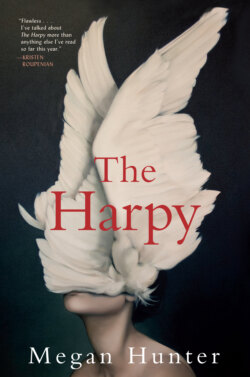Читать книгу The Harpy - Megan Hunter - Страница 14
На сайте Литреса книга снята с продажи.
Оглавление5
It was the worst-case scenario: he was back past eight o’clock, the boys asleep, me wide awake, curled in Ted’s bed, my arms around him for comfort. It is wrong to look to your children for comfort, I knew that. And yet I had so many moments like this: after a bad afternoon, a bad year, his body against mine, his sleep the most soothing rhythm I could imagine. I had sung Ted to sleep that night; he’d asked for it, even after Paddy clamped his hands over his ears and howled Shut up! Both boys, in fact, had lain down quietly in the end, and I had sung until my throat was sore and the phone message seemed abstract, only very distantly dangerous, like a firework alight in the sky.
I heard the scrape and accordion-like breath of the door, so familiar, Jake’s steps, his bag going down on the chair beside the table. I didn’t move. Jake called out, softly, from the bottom of the stairs. He might have thought I was still wrestling with the consciousnesses of our children, pushing them into the softness of sleep. Too often, he had come up just at the point when Ted’s eyelids were drooping, and I’d had to start the whole process again. So he only called once. I heard him go into the kitchen, shut the door, put his dinner in the microwave.
I think my parents were liberal with television too, because all I saw when I imagined dramatic scenarios in my life were those in TV shows: certain episodes I’d seen over and over, that seemed to have greater texture than my own existence. I could not think of a way to confront Jake that did not feel scripted, stilted, too cheesy or on the nose. I could fling myself at him, pummel his chest with my fists, demand that he tell me everything. I could, carefully and without crying, cut every single one of his work shirts into shreds. I could—
Ted stirred, his arm surprisingly heavy and strong in his sleep, falling backwards like part of a sail turned by the wind. He moaned something indecipherable, made an attempt to stretch out on the whole bed. I was going to have to leave. I thought of creeping upstairs, to our room, pretending to be asleep, but the thought was too lonely, too cold somehow, as though I could already feel the emptiness of the sheets, the particular creak the bed would make when Jake eventually came up, found me with my eyes closed.
As I started down the stairs, I briefly considered acting as if I didn’t know, but the precariousness of this was obvious – she would tell him. And at the thought of her – the name had become unbearable, suddenly – something changed. Something became untethered inside me, as I had often feared it would, one organ seeming to break free from the rest, left to float, uprooted, around my body.
For as long as I could remember, I’d had a terror of my own heart. As a ten-year-old, I insisted that it was missing beats, ended up with my flat chest covered in circular plastic suckers at the doctors. My heart, it was proclaimed, was healthy. At sixteen, wracked with exam stress, I was even given a heart monitor, a hidden plastic visitor meant to record the incidents I kept feeling, my heart fluctuating, squirrelling, trying to break free.
I had been given the all-clear that time too, and no longer felt I could mention the things my heart did, all of its dives, its inversions, its battle for release. I gripped the railing of the stairs, feeling wrongness squirm and flip somewhere unseen. By the time I was standing in front of Jake, I was sweating, breathing quickly: I hardly needed to say a thing.
